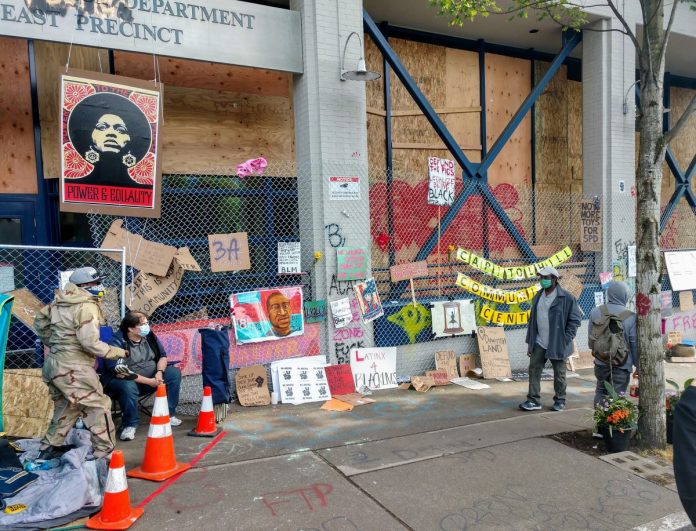
Seattle is still struggling for justice and constitutional policing 12 years into federal monitoring via the consent decree.
More than 12 years ago, 34 Seattle community organizations wrote to the Department of Justice (DOJ) asking them to open an investigation into a pattern of excessive use of force used by the Seattle Police Department (SPD), particularly against people of color. As a result, in the summer of 2012, the DOJ and the City of Seattle entered into the consent decree.
Unfortunately, the consent decree has not lived up to hopes and promises; instead, it has been inordinately expensive, taken key decisions out of the hands of community members, and failed to achieve the low bar of ensuring constitutional policing by the SPD. Most importantly, community members continue to be brutalized and killed by SPD officers.
Now the consent decree is trailing to a close, with presiding Judge Robart issuing a ruling this week terminating a large portion of the decree and setting up additional milestones to demonstrate compliance with its use of force and accountability requirements. The timeline laid out by Judge Robart suggests that if the negotiations for the long overdue 2021 Seattle Police Officers Guild (SPOG) contract are completed to his satisfaction in the first months of next year, full termination of the decree can be achieved by spring/summer 2024.
As the City and the SPD spend the next several months taking a victory lap, it behooves us to consider the downsides of this process.
Consent decree mandates have forced Seattle to fund wasteful, ineffective, and harmful policies. The consent decree has resulted in an increasingly bloated SPD budget: SPD’s budget has ballooned by 48% since the decree was instituted, preventing Seattle from investing $122 million — every year — in effective public health and community safety programs. The Mayor’s Office estimates that consent decree programs have cost the city an additional $200 million.
Some of these programs were a blatant waste of money, such as the Early Intervention System shown to have no predictive power. The wasteful spending mandated by the consent decree has exacerbated Seattle’s ongoing homelessness crisis; record numbers of people experiencing homelessness died in King County in 2022.
The consent decree has also undermined local democracy, thwarting and marginalizing broad-based, grassroots community advocacy for equitable public safety. In response to the historic George Floyd protests in the summer of 2020, the Seattle City Council committed to investing in effective public safety programs – not failed, violent strategies like policing. However, SPD used the consent decree as a club to prevent systemic change, and Judge Robart had “harsh words” for City Councilmembers trying to respond to their constituents’ requests for real safety.
The judge also blocked the City Council’s tear gas and blast ball ban even as police officers ignored court orders and inundated Seattle neighborhoods with chemicals prohibited under the Geneva Convention. Officers’ callous, unlawful disregard for public safety later caused another federal judge to fine the City for contempt of court. The consent decree has been used repeatedly as an excuse for inaction, maintaining the failed status quo.
Unfortunately, the consent decree has also failed at preventing unconstitutional policing in Seattle. More than one out of every 20 Terry stops conducted by SPD are unconstitutional, unable to clear the extremely low bar conservative federal courts have set for policing. Additionally, roughly one out of every seven frisks are unconstitutional. SPD continues to detain and frisk Black and Indigenous community members at much higher rates than White community members: Black and Indigenous community members are respectively five times to seven times more likely to get stopped and six times to seven times more likely to be frisked than White community members, even though White community members are over 50% more likely to be found with a weapon when frisked.
Meanwhile, in the more than 11 years since the signing of the consent decree, our friends, neighbors, and loved ones continue to be brutalized, injured, and killed by SPD officers. During the 2020 George Floyd protests, allegations of excessive use of force increased by 170%, almost 17,000 complaints were filed with the Office of Police Accountability (OPA), and a whopping 40% of SPD officers received at least one complaint. SPD deliberately targeted medics and journalists at these protests, demonstrating their contempt for civilian oversight.
In studying the data of people killed by SPD from 2015 to 2021, data scientist Dr. Sherry Towers, who has researched violence for both the Department of Homeland Security and the Carter Center, wrote, “police homicides of civilians have increased in the period when the SPD claimed to have successfully reformed, and racial disparities in this regard have gotten worse.” She also found that the rates of police killings per homicide in Seattle were three times the national average, with one out of 10 killings in Seattle committed by a police officer.
Towers’ findings support analyses by local activists, who found SPD-caused deaths increased 38% between 2013 and 2021.
When the community asked the Department of Justice to investigate the SPD back in 2010, the hope was that the investigation would help end SPD’s abusive, discriminatory practices. However, after waiting more than a decade to see results, we have no choice but to conclude the consent decree does not address these problems; indeed, it has acted as a barrier to much-needed progress.
Now, with the consent decree coming to an end, the City should reduce contact between the police and the public and invest in upstream solutions that address the social determinants of safety, prioritizing communities suffering the highest rates of insecurity and violence and ending the inequality that makes all of us less safe.
Amy Sundberg is the publisher of Notes from the Emerald City, a weekly newsletter on Seattle politics and policy with a particular focus on public safety, police accountability, and the criminal legal system. She also writes science fiction, fantasy, and horror novels. She is particularly fond of Seattle’s parks, where she can often be found walking her little dog.


